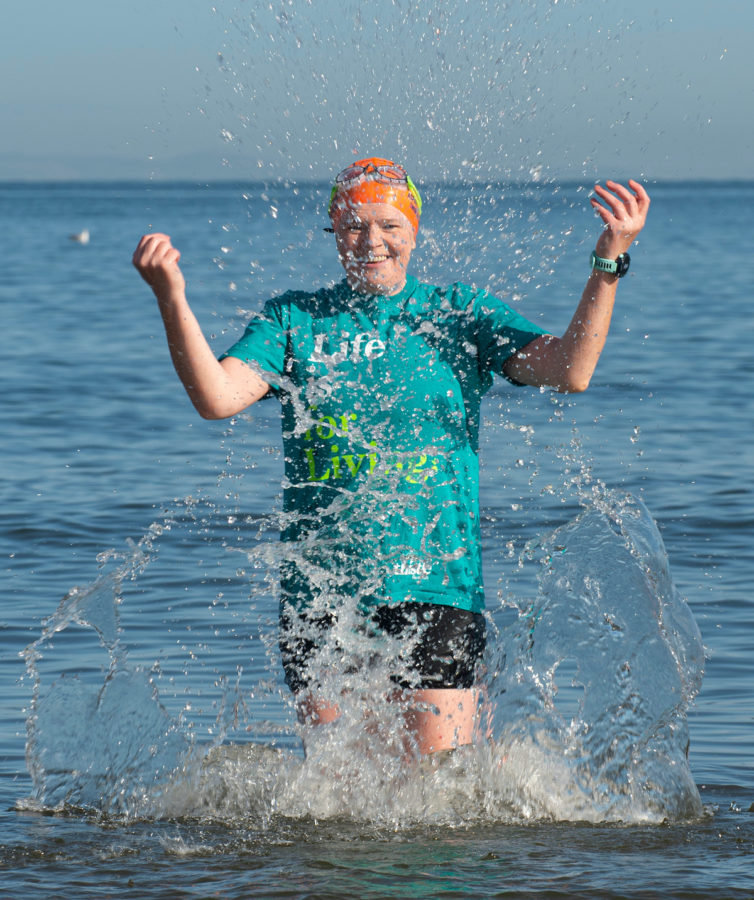Dawn’s wild about swimming
Dawn was medically retired at the age of 35, but with support from Edinburgh health and wellbeing charity, Thistle, she has turned the tide.
Now Dawn has returned to work as well as realising her lifetime dream of swimming across the Channel. Bedridden with back pain and needing a wheelchair to leave the house, Dawn approached Thistle for support.
Dawn said: “At 35, I was medically retired and told I could never work again. It seemed like my life was over.
“Thistle asked what my hopes for the future were and I didn’t know how to answer. I told them my wildest, most unrealistic dream: to start swimming again. It had been my big passion. I never imagined that my dream could come true.
“I expected the Thistle wellbeing practitioner to write the idea off. Instead she listened, focused on me and what I needed and together we talked about what it would take for me to be able to rebuild my physical strength and get back into a pool. With small steps, I started to develop my physical and emotional health. “
Seven years later Dawn went back to work as a Health and Wellbeing Practitioner at Thistle. She explained: “It means so much to me to be able to support people who are struggling with their own health. Thistle gave me hope. Now I can give that to others.”
In 2017, Dawn discovered wild swimming. She now swims every week in lochs, reservoirs or the sea. She admits that she is not completely pain free. She said:“I still have back problems and always will, but I am able to do what I love and when I’m in pain the water helps. Last year, I applied to swim the English Channel as part of a relay team and in December 2019, I received word that I had been accepted for summer 2020!”
As lockdown came in this year, Dawn found the transition to home working difficult. She said: “It brought back memories of being housebound and reliant on my wheelchair. It was difficult, but I have adjusted. And I’m so grateful I’ve been able to keep working, supporting people who are struggling to take back control of their lives because of their long-term health conditions.
“For a while, I even managed to keep training for the Channel swim. But then one afternoon in July, I started to feel unwell. It happened very quickly and I was taken to the hospital. I had Covid-19. All I could think was ‘this can’t happen, I need to swim the Channel!’
“I made up my mind that I wasn’t going to let it stop me. The organisers agreed to move the swim back by a month. I thought back to Thistle’s support from when I first arrived and started using the techniques again. I built myself up and after 6 weeks, I got back in the water.”
In September, just eight weeks after becoming ill with Covid-19, Dawn achieved her goal – she swam the English Channel.





She said: “My first swim was at 3am, jumping off the boat into the darkness of the sea. The conditions were perfect and water was warmer than back home in Scotland. I worried about the strict rules – don’t touch the boat, look for the signal for the next swimmer – but it went okay and my first stretch was done.
“The weather was gorgeous for my 9am swim, I knew I had to swim this stretch quite quickly, before the tide changed and I did what I had to do. But inside, I was getting quite emotional. It hit me just as I made my way into the water – I was so close. I had hung onto this goal my whole life and instead of feeling elated, I felt like I was losing something.
“When I first said I wanted to swim the Channel it represented me getting back to being me. It represented me being active, out doing the things I love, having a buzz for life. But I had already achieved that before the swim. It was a flag at the top of a hill I had already climbed. At that moment I had the strange realisation that this was never really about the swim.
“The team briefly touched French shores before returning to England by boat. Dawn said: “I had never seen my daughter so emotional before and that set me off. My Dad couldn’t stop hugging me, telling me that Mum would’ve been proud. I received so much support – over 4000 messages on social media, including people who had last seen me in a wheelchair.
“I feel proud reading those messages, reading people saying that they are inspired by what I have done. I don’t think I’m special or different to anyone else, I was just really lucky to find the support I needed when I did. If my swim gives someone the hope to contact Thistle or to believe that they can achieve something ‘impossible,’ that makes me happy.”
